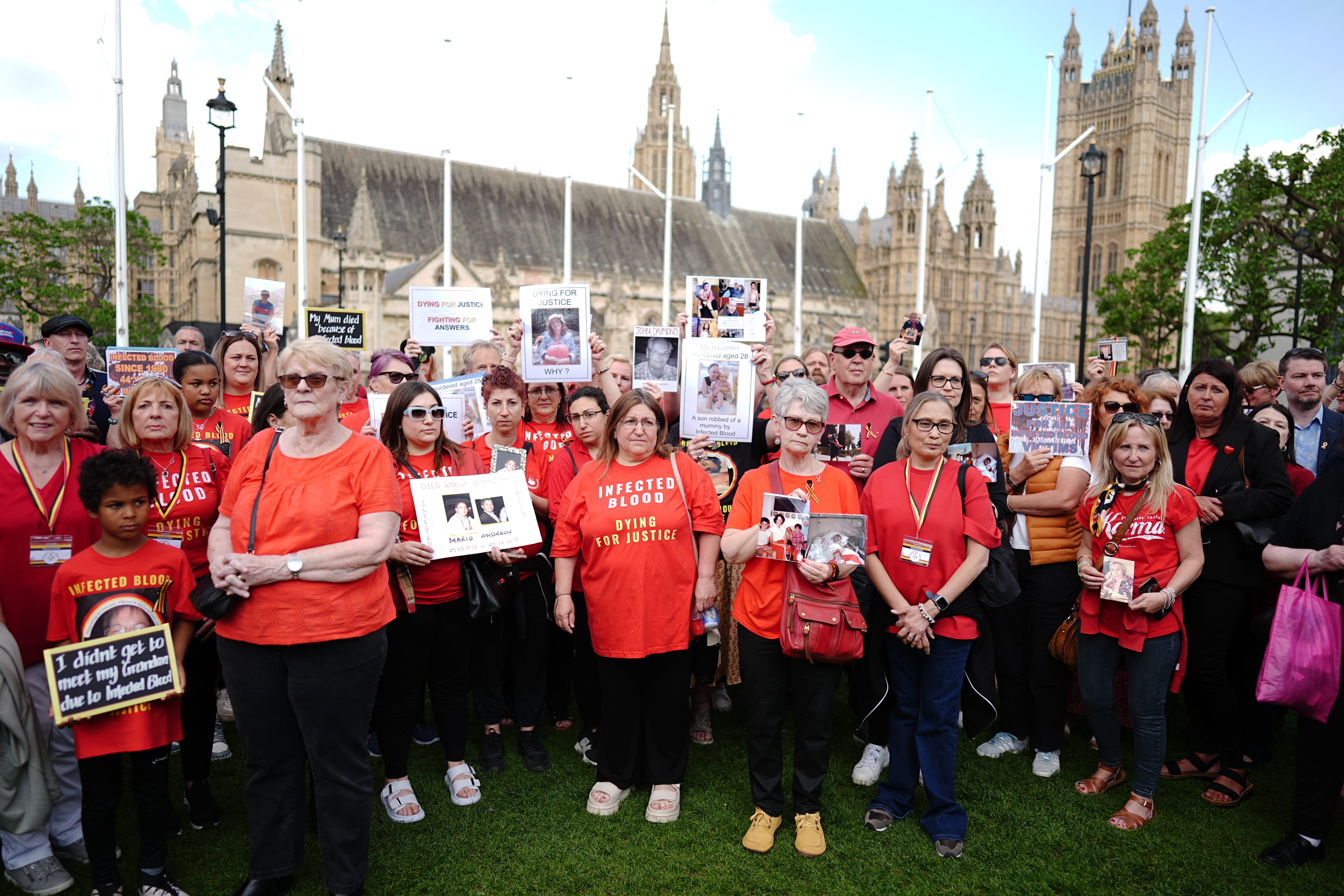Infected blood scandal campaigners say fight ‘not over yet’
Hundreds of those affected by the scandal gathered at Westminster on Sunday afternoon to mark the end of the Infected Blood Inquiry.

Victims and relatives affected by the infected blood scandal have vowed that their fight is “not over yet” as they paid tribute to the people who have died.
Campaigners were praised for their “tireless” efforts to get justice for people affected by the scandal – dubbed the worst treatment disaster in the history of the NHS.
The Infected Blood Inquiry, which was launched in 2017 by former prime minister Theresa May, will publish its final report on Monday and is expected to shine a light on how “wrongs were done at individual, collective and systemic levels”.
Tens of thousands of people were infected with contaminated blood products or blood transfusions between the 1970s and early 1990s.
An estimated 3,000 people have died as a result while those who survived have lived with life-long health implications.
Hundreds of those affected by the scandal gathered at Westminster on Sunday afternoon at an event organised by the Hepatitis C Trust to mark the end of the inquiry.
Some of those in attendance have been campaigning for decades for justice.
Attendees held a one-minute silence to remember people who have died.
Rachel Halford, chief executive of The Hepatitis C Trust, said: “It has been a really long road to get here.
“We would not be here without the tireless campaign efforts of all of the people in the community – you signed petitions, spoke to the media, shared your experiences with the inquiry, lobbied your MPs and fought tooth and nail to be heard.”
She added in a statement: “But the fight is not over yet. Action from Government to right these historic wrongs is needed as urgently as ever: more than 650 who received infected blood or blood products have died since the Infected Blood Inquiry began.
“The Government must implement all the recommendations of the inquiry and announce a clear timeline for when compensation payments will be made as soon as possible.”
Meanwhile, MP Dame Diana Johnson, who had lobbied on the issue for two decades, spoke of her emotion as she addressed the crowd.
She said: “The journey has been far too long and far too slow and we know that many are not here when they should be.”
Andy Evans, co-founder of campaign group Tainted Blood, told the crowd: “We’ve lost so many people to this scandal along the way.
“Many of you are here because you’ve lost someone. Our journey to this point has been defined by loss, and hurt, and sadness and by anger.
“We will never forget all that we’ve lost, but with each other’s help, perhaps now, here, is where we start to heal.”
Mr Evans contracted hepatitis C and HIV when he was five years old from being given an infected product in the 1980s.
Joan Edgington, a mother-of-two who contracted hepatitis C when she received infected blood in 1991, addressed the crowd as her “tribe”, adding: “This is a bond, a connection that was cruelly forced upon us but now we use it as a driving force.”
Pe Rae stood in the crowd holding a picture of her husband Paul Le Bourn who died 10 years ago from liver failure after contracting hepatitis C from a contaminated blood transfusion in 1982.
She told the PA news agency: “Paul was a feisty, loving, funny person. He was a social worker down in Hampshire.
“He contracted hepatitis C from contaminated blood after a road traffic accident. He wasn’t diagnosed for 15 years.”
Ms Rae, 64, from Lyndhurst, Hampshire, said she hoped the inquiry would raise awareness of hepatitis among medics and people who had transfusions before the mid-1990s.
Former soldier Brendan West lost his leg in 1979 and was given blood transfusions while at a British military hospital in Germany where his leg was amputated. Four decades later, he discovered that the blood he was given was infected with Hepatitis C.
The 63-year-old told PA: “Today is… for all of those who died and suffered unnecessarily. Tomorrow is about the truth, there will be nowhere to hide. Tuesday will be about the Government and what action is required.”
Joanne Vincent, from Worthing, was one of hundreds of mothers infected with contaminated blood after giving birth.
Speaking ahead of the inquiry she said: “I feel relief and anxiety.
“Once Sir Brian Langstaff hands over the report then we lose our kingpin, he is the one who has kept us all together. We lose him because his job is done and he hands over to the Government. I want the Government to stop talking empty words and to start acting.”
Speaking ahead of the inquiry, a Government spokesperson said: “This was an appalling tragedy that never should have happened.
“We are clear that justice needs to be done and swiftly, which is why have acted in amending the Victims and Prisoners Bill.
“This includes establishing a new body to deliver an Infected Blood Compensation Scheme, confirming the Government will make the required regulations for it within three months of Royal Assent, and that it will have all the funding needed to deliver compensation once they have identified the victims and assessed claims.
“In addition, we have included a statutory duty to provide additional interim payments to the estates of deceased infected people.
“We will continue to listen carefully to the community as we address this dreadful scandal.”
Bookmark popover
Removed from bookmarks